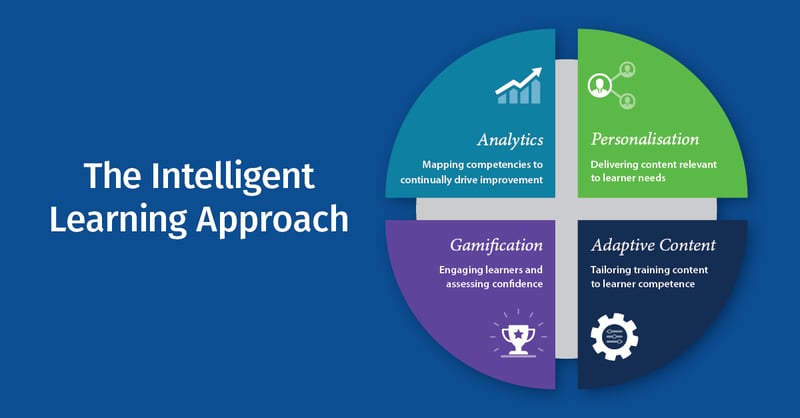The Instructor-led e-learning experience
As companies adapt to new ways of working, the way we learn is also adapting. We need to be more agile and responsive in how we share knowledge with those who need it.
One positive development is that the use of video conferencing is getting senior managers and other subject matter experts more relaxed and more excited about recording themselves online!
And here at Skillcast we are helping our clients to transform those videos into interactive digital content that can be tracked on your Learning Management System (LMS) all at minimal cost.
How Instructor-led e-learning works
Our short video explains how Instructor-led e-learning with Intelligent Learning elements added can raise your training effectiveness up to another level.
Not got access to YouTube? Watch this video in YouTube
What you need to provide:
Trainer video – Ideally these are bit-sized clips of around 2 minutes, but don’t worry, if you just have 30 minutes of video we can crop it into smaller learning points.
The Intelligent Learning elements we then add include:
Facilitator – a virtual guide that helps structure the content, who is used to introduce the videos and tell the employee what they should expect/take away before each clip. The guide also poses questions to check the employee's understanding and ability to apply what they have learnt to practical business situations after the video clip.
Personalisation – each employee goes through a learning experience that is personalised to their needs and preferences.
Learning inputs – in addition to questions that test the employee's comprehension and application, the training can include a survey of their attitudes and preferences, and open-ended questions to help them analyse and synthesise. These inputs may also be used to adapt the training and drive business operation improvements.
Further resources – these can include a variety of pre-course and post-course reading, workbooks, checklists and an affirmation that employees must make to complete their training.
Takeaway notes – the whole training session, including the employee's responses and notes, can be packaged and downloaded as a PDF for them to use in their job roles.
See Instructor-led e-learning in action...
We've created a dedicated delegation training module with Chris Croft, a leading writer and trainer. Access 'Learn How to Delegate' for free now!
How Instructor-led e-learning can benefit your organisation
- Your company can utilise your internal resources and source external specialist presenters.
- Recording the video gives you the ability to deliver a higher-quality audio-visual experience than an ad-hoc MS Teams or Zoom session could provide.
- The learning experience is consistent for each employee who goes through it.
- The experience is personalised to each employee – they can do the training at their convenience, proceed at their own pace, explore resources, take notes and compare their responses with those of their colleagues.
- At each step, we ensure that the key action points are clearly understood.
- The training can be created quickly, at a fraction of the cost of traditional e-learning and repeatedly delivered at minimal cost.
Enhancements to the training experience
Other approaches to enhance the training experience include social learning/webinar, real-world activities, point-of-need training and bite-sized learning.
Social learning/webinar
It is always valuable to consider a blended approach. For example, the content could sit alongside a webinar that draws on key training points and is the perfect place for discussion and questions. Alternatively, or in addition, you could link learners through to your organisation's social tool – be that Yammer or something else – to post thoughts or opinions about the topics involved. On-going learning is a great way to embed ideas and behaviours, as well as ensure that a learning culture permeates through your company.
Point-of-need information
At its best, face-to-face training is conducted exactly when learners need it, to ensure that it is fresh in their minds for new roles, tasks or situations. It covers just as much information as each participant requires, leaving them prepared to face the next challenge.
Now consider how online content can do the same:
Modular, bite-sized training allows the learner to dip into it at any time, return to refresh themselves on key sections and easily navigate to the content that they require. Which means that it feels practical and relevant, rather than being a one-hit solution that is completed only annually.
Making learning stick with practical activities
Learning only really sticks if it is an active experience – and this is true no matter what medium it comes in. The following activities can be built into any module to ensure that learners are getting to practise what they learn. Any learning content can be turned into interactive screens – from drag-and-drop exercises and scenario-based questions to gamified experiences, where learners click to discover more, find content broken into memorable chunks and navigate easily through the course at their own speed.
Real-world scenarios
If you want your staff to complete something 'in the real world' as part of the training, this can be referenced and explained in the course, with a page on which the learner ticks a box to confirm that they have completed the activity. This could be supported by additional documents or best-practice examples in the resources area. It allows them to act and make immediate progress - for example, setting a meeting with their manager, planning a team social, reflecting on their progress or writing an action plan.
Gamified knowledge checks
Unlike a face-to-face session, learners are in a safe and private environment when they are online, which means that we can challenge them to apply their knowledge in realistic scenarios that show the consequences of incorrect actions through branching feedback. In-course scoring can be used as a mechanism to chart strengths and weaknesses, rather than having a pass/fail mechanism.
Emulating two-way conversations
The following options create a more personal experience that emulates conversations and lets the learner ask questions, which turns the training into more of a two-way experience.
Mentor/facilitator
A mentor/facilitator appears at various points during the training to provide support, mirroring the role of a face-to-face trainer, and underscoring the importance of real-world coaching and continuous learning. One option would be to use your existing trainer as the mentor, and we can incorporate photos and video clips of them.
Conversation tool
This device allows us to add conversational elements so that the learner can ask questions, which makes the training feel more like a dialogue than a one-way learning experience (branching learner journeys can further enhance this). The learner gets to ask a range of questions (in any order that they prefer) and chatbot-style responses are displayed. This exploration-style activity reflects classroom training, but it can also encourage learners to reflect on further questions that they might want to ask – and who they can go to for support.
Want to see instructor-led eLearning in action?
If you'd like to see a live example of instructor-led training, we have published our delegation training module as a free to access course.
And if you are considering a project we'd be delighted to speak with you. Whatever your needs, we will advise you on your options with clear pricing indications.
Just book a free exploratory consultation at a time that suits you.
Looking for more compliance insights?
If you'd like to stay up to date with best practices, industry insights and key trends across regulatory compliance, digital learning, EdTech and RegTech news subscribe to Skillcast Compliance Bulletin.
To help you navigate the compliance landscape we have collated searchable glossaries of key terms and definitions across complex topics including GDPR, Equality, Financial Crime and SMCR. We also track the biggest compliance fines, explaining what drives them and how to avoid them.
You can follow our ongoing YouGov research into compliance issues, attitudes and risk perceptions in the UK workplace through our Compliance Insights blogs.
Last but not least, we have 60+ free compliance training aids, including assessments, best practice guides, checklists, desk-aids, eBooks, games, handouts, posters, training presentations and even e-learning modules!
If you've any questions or concerns about compliance or e-learning, please get in touch.
We are happy to help!





